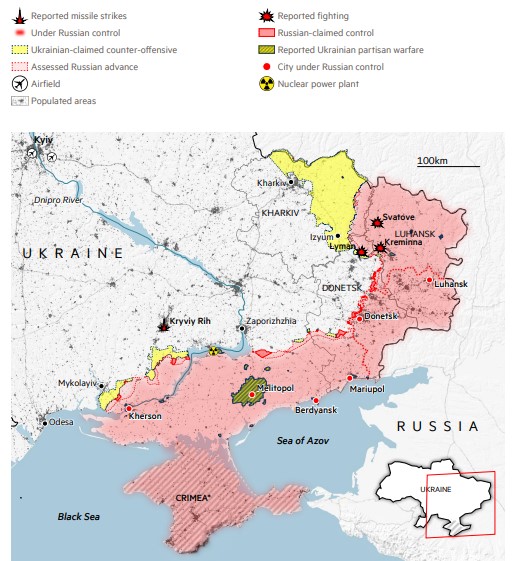Strategic UPDATE
The war in Ukraine has effectively entered its third phase as Russia is now implicitly acknowledging its desperation. Ukraine has managed to seize the momentum of the war and with winter rapidly approaching, the Kremlin has shifted course to solidify its gains before it is too late. With the proposed accessions of the Russian-occupied territories in Ukraine, President Putin will now have the internal legitimacy to escalate the war.
- On 21 September, Russian President Vladimir Putin announced the partial mobilization of up to 300,000 citizens with specialist training and military experience. The mobilization announcement comes on the heels of a successful Ukrainian counteroffensive in north-eastern Ukraine that now threatens Russian control of territory it occupies in the Donbas—whose liberation has been Russia’s main stated objective since late March.
- On 20 September, Russian-appointed officials in occupied Kherson, Zaporizhia, Luhansk, and Donetsk oblasts announced referenda on accession to the Russian Federation which will be held 23-27 September.
- Also on 20 September, Russia’s State Duma unanimously passed an amendment to the criminal code, establishing penalties for “crimes against military service” if they are committed during mobilization, during wartime, under martial law, or under conditions of any armed conflict. The law increases penalties for desertion, insubordination, and voluntary surrender.
- On 21 September, anecdotal reports circulated that Russian railways and Aeroflot halted ticket sales to men ages 18-65, a claim that the companies have since denied. Border crossings are reportedly closed to males aged 18-45.
ANALYSIS
 The annexation announcement is meant to dissuade Kyiv from continuing its counteroffensive and convince its Western benefactors that continued financial and material support for Ukraine can lead to a more severe Russian response, as Russia will now see Ukraine as attacking its territory. Putin’s threat to use “all means” is a tacit threat to use nuclear weapons, as Russian nuclear doctrine provides for the use of a first strike in defense of the homeland.
The annexation announcement is meant to dissuade Kyiv from continuing its counteroffensive and convince its Western benefactors that continued financial and material support for Ukraine can lead to a more severe Russian response, as Russia will now see Ukraine as attacking its territory. Putin’s threat to use “all means” is a tacit threat to use nuclear weapons, as Russian nuclear doctrine provides for the use of a first strike in defense of the homeland.
- The mobilization and referenda together signal a shift in Russian domestic framing for the war and an unprecedented acknowledgment of force insufficiency. Annexation will force Russia to deploy conscripted forces already integrated into the military to eastern Ukrainian territory quickly to rebuff the current Ukrainian counteroffensive.
- By enacting a partial rather than full mobilization and continuing to refer to the war as a special military operation, Putin is balancing pressure from hardliners calling for a more robust commitment to the war effort with the potential unrest that a full mobilization—especially with the conscription of the urban elite—and declaration of war could incite.
LOOKING AHEAD
- Russia does not have the capacity to quickly mobilize 300,000 troops. The process will take months if not a year to accomplish. The Kremlin will directly increase force generation through continued voluntary self-mobilization and an expansion of its legal authority to deploy Russian conscripts already with the force to fight in Ukraine. Russia should be able to quickly send in several thousand troops to the frontlines; however, their training levels and morale will be even lower than the current lot. Even in the short-run, it is unlikely they will be able to prove effective on the battlefield.
- The annexation of Russian-controlled territory is irreconcilable with Kyiv's new aim to regain all of Ukraine's territory. This will make the prospects of any negotiated settlement even dimmer.
- Understanding the desperate situation, Putin will now be more inclined to "win at all costs." We have already seen a recent increase in Russia's willingness to target Ukrainian civilian infrastructure (electricity, water, and communications), we can now expect more.
Support
Our team can respond immediately with the following capabilities:
- Bespoke intelligence reports and briefings
- Armed or unarmed security personnel
- Satellite communications (phone and wireless internet)
- Emergency medical and tele-medical support
- Logistical support
- Evacuation by ground where feasible
Click below to contact Global Guardian's 24/7 Operations Center or call us directly at +1 (703) 566-9463.




